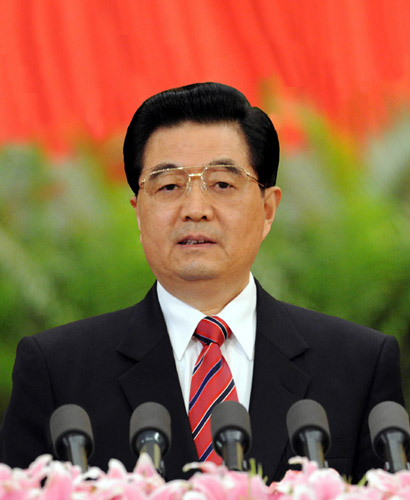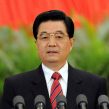
The Soapbox and the Truncheon: Hu Jintao’s Amorphous Power
Publication: China Brief Volume: 12 Issue: 14
By:

The last ten years in China have been difficult ones, filled with tremendous opportunities and challenges as China has deepened the reform and opening policies of Deng Xiaoping—or so the official press now proclaims (People’s Daily, July 11, July 9). These editorials did not name names, seemingly reflecting one of the remarkable characteristics of Hu Jintao’s ten-year tenure as general secretary: his coyness when big events occur. During the crises of this spring, Hu’s coyness was very much in evidence. Following the fleeing to the U.S. Consulate in Chengdu of Wang Lijun—a key ally of the deposed Chongqing Party Secretary Bo Xilai—in February, Hu has been reported only as making one direct remark on the whole affair, branding Wang “a traitor” at an internal meeting in early March (South China Morning Post, March 6). Hu so far has made no direct comment on the Bo case itself and avoided the case of blind human rights activist Chen Guangcheng fleeing to the U.S. Embassy in late April and early May. For that matter, Hu never made any direct statement on the award of the Nobel Prize to Liu Xiaobo in 2010, nor, at the time, did he remark directly on the uprisings in Tibet in early 2008 or Xinjiang in 2009 and Inner Mongolia in 2010. He left the first two of these high-level meetings in Beijing in 2010 to opine in the abstract, non-committal language that Hu always uses. This raises the question of just how strong a leader is Hu, and to what extent is he really in charge? Is his ambiguous silence a sign of a profoundly calculating, brilliant politician, or someone who simply lacks the capital to speak out front?
President Hu has a long history of reticence. Willy Lam reports that, in 1989, while Party boss of Tibet, Hu mysteriously went missing before the decision had to be taken by the local police chief to send in troops against protestors [1]. “Delegating” the decision in this way, Hu would have avoided direct censure had anything gone wrong. As it was, all was well and his promotion followed two years later. In his handling of the uprising in Tibet and Xinjiang in 2008 and 2009 respectively, and in the removal of Shanghai Party Secretary and Politburo member Chen Liangyu in 2006, analysts can find some insights into how Hu wields power as the general secretary. Chen’s fall, in fact, gives us some of the most relevant information. The official statement of Chen’s removal on September 25, 2006, was conveyed in language that stressed the importance of institutional sanctions rather than any direct intervention by Hu: “The [Chinese Communist Party (CCP)] Central Committee said it believed corruption would be curbed under the leadership of Hu Jintao as general secretary and with joint efforts of all Party members and the public.” The statement added “Whoever it is, no matter how high their positions are, anyone who violates party rules or national law will be severely investigated and punished” (Xinhua, September 25, 2006). This language would be duplicated six years later with Bo Xilai.
There are three issues here. The first is whether or not Hu’s leadership is—in the words of one internal critic—built on “empty rhetoric,” which has made an increasingly comfortable accommodation with state-sanctioned violence to deal with social issues in Chinese society as it has become more conflict prone in the last decade. Referring to one of Hu’s annual talks to the Central Discipline and Inspection Commission in 2010, academic Liang Jing (a pen name) complained “Hu has realized that he cannot carry on ruling by empty rhetoric to the end of his term, and believes only by applying naked secret police methods can be reign in high Party officials” (New Century News, January 26, 2010). The major issues here are how to deal with the rise of social media and the connectivity it brings in Chinese society, the growth of vested interests alongside the immense wealth creation of the last decade and, finally, the swathe of rights-conscious protests that have risen. Hu’s strategy appears to be to say one thing (e.g. observe rule of law) and do another (e.g. repress as and when it suits Beijing).
This connects to the second issue. Everything since the Wang Lijun incident shows the ambiguities of Hu’s era in power. On the one hand, there was the powerful editorial that declared “China is a socialist country under the rule of law. The dignity and authority of the law should not be trumped. No matter who is involved, if he is against the law, he shall be punished in accordance with law without fail.” The editorial continued that in this strategy the CCP has the support of “the people of the whole country. It has forged a powerful force for reform, development and stability” (People’s Daily, April 11). Zhou Yongkang, the Standing Committee member in charge of the legal, made similar remarks while visiting Wuhan in late April, stating the key aim was “to safeguard people’s lawful rights and interests to uphold social justice and maintain social stability” (Xinhua, April 22). Such comments from a suspected patron of the felled Bo underlined the re-emergence of consensus in the Hu-ist collective leadership. The problem here—as Qiao Mu, an academic in the Beijing Foreign Studies University stated two weeks later—was that after the People’s Daily previously enthusiastically praised Bo Xilai’s “Chongqing Model,” ”How can we expect the public to trust and relate to such a media outlet?’ (South China Morning Post, April 28). The case of Chen Guangcheng with the multiple claims of illegality in his detention over the last year highlights all too starkly how, contrary to what Hu says, all too often there is no rule of law. As one of the local officials stated to Chen, according to his recorded testimony released on the April 29, “There is no law. We make the law.”
The third issue is the issue of the highly-restricted space that Hu has inherited. The People’s Daily editorials quoted above underline this, issuing their proclamations with Hu stated as “the Party Secretary of the CCP Central Committee” (People’s Daily, April 11). Hu might be talked of as core of the fourth generation leadership, but that is outside of China. Inside China, he is not even accorded the rank Jiang Zemin had in the 1990s, when he was marked in official discourse as “core of the third generation.” This raises questions about Hu’s authority and the legitimacy given him within the party.
On top of these are problems of understanding the structures by which Hu wields power as part of this collective leadership. Reports suggest Bo’s fall only received sanction after a meeting of the Politburo a day after the National People’s Congress closed on March 20. Time and again, decisions are held up until the Politburo can meet—from issuing a collective line on the unrest in Tibet and Xinjiang to sanctioning the response on Liu Xiaobo’s Nobel Prize. One sees since 2002 an enhanced role for the leading small groups as final decision-making entities—probably granting relative autonomy for the group chair—but from time to time evidence suggests, on critical issues like Tibet, in Xinjiang and North Korea, Hu has to sign off. He reportedly needed to leave the G8 meetings in Rome in July 2009, because he needed to be back in the country to authorize the deployment of security forces after the eruptions of unrest in Xinjiang [2]. There is a tension in the current leadership over being transparent (even to the limited extent of intra-party democracy) and yet still maintaining enough opacity to keep tension in the system. Only the Foreign Affairs Leading Small Group has ever been acknowledged in the official press, but under Hu, for the first time, some reports of Politburo meetings have been issued.
Perhaps to make sense of Hu’s role in decision making, we need to be clear about two things that have come out in the last months of ongoing crisis. On the one hand, the keywords remain: “reform,” “development” and “stability” (People’s Daily, July 11). Hu’s macroeconomic policy must deliver these. They were used densely in his report to the 17th Party Congress in 2007, and they keep appearing in the People’s Daily, such as the April 12 and early July editorials. The logic is that without these three, then all other policy aims fall by the wayside. In an era of economic and social transition and while China remains a developing country where rule of law is an aspiration, there are times when it cannot deliver what is expected and more primitive methods kick in.
The second is that Hu has had to try to maintain the strategy of institutionalizing the party’s governance structures, so that the kinds of strong man politics under Mao Zedong—and to a lesser extent Deng—are avoided. The strong distaste for charismatic leadership has a deeper influence on modern Chinese politics than many suspect, and may well lie at the heart of Bo’s own fall. Hu, however, also needs a more institutionalized policymaking process to exercise what influence he has without the legitimacy of being the “core of the fourth generation.” Hu’s challenge has been to do this as the CCP and society have become more pluralistic and increasingly fragmented. Trying to achieve a seamless leadership transition in these circumstances was always going to be tough.
To say that Hu has no power would be senseless. To say that he has had to exercise what power he has in a dynamic, changing context, with wholly different levers that his predecessors comes nearer the mark. Hu’s objectives have been to deliver growth through stability and reform through a consensus-led, unified leadership without the kind of party-wide strong arm politics of the past. He has had to do this often with the deployment of some unpleasant repressive measures to deal with internal party and national challenges.
Hu may have been able to purge Chen Liangyu and Bo Xilai, but his ability to remove the former’s challenge did not allow him to place his people at the 17th Party Congress. How Bo’s purge affected the power dynamics in the next leadership selection remains to be seen. If anything, these leadership crises have shown Hu by himself is able to operate at the extremes, exhorting rhetorically across the system or picking off individual challengers—broad but ineffectual, narrow but powerful. More institutionalized policymaking may have offered Hu a way to guide policy without being a strong man, but this process also gave his opponents more opportunities to obstruct him. Only time will tell, however, whether the growing stagnancy in the Chinese political system happened because of or in spite of Hu Jintao.
Notes:
- Willy Wo-Lap Lam, Chinese Politics in the Hu Jintao Era: New Leaders, New Challenges, Armonk, NY: M.E. Sharpe, 2006, pp. 8–9.
- Private Communication, Beijing, 2009.





